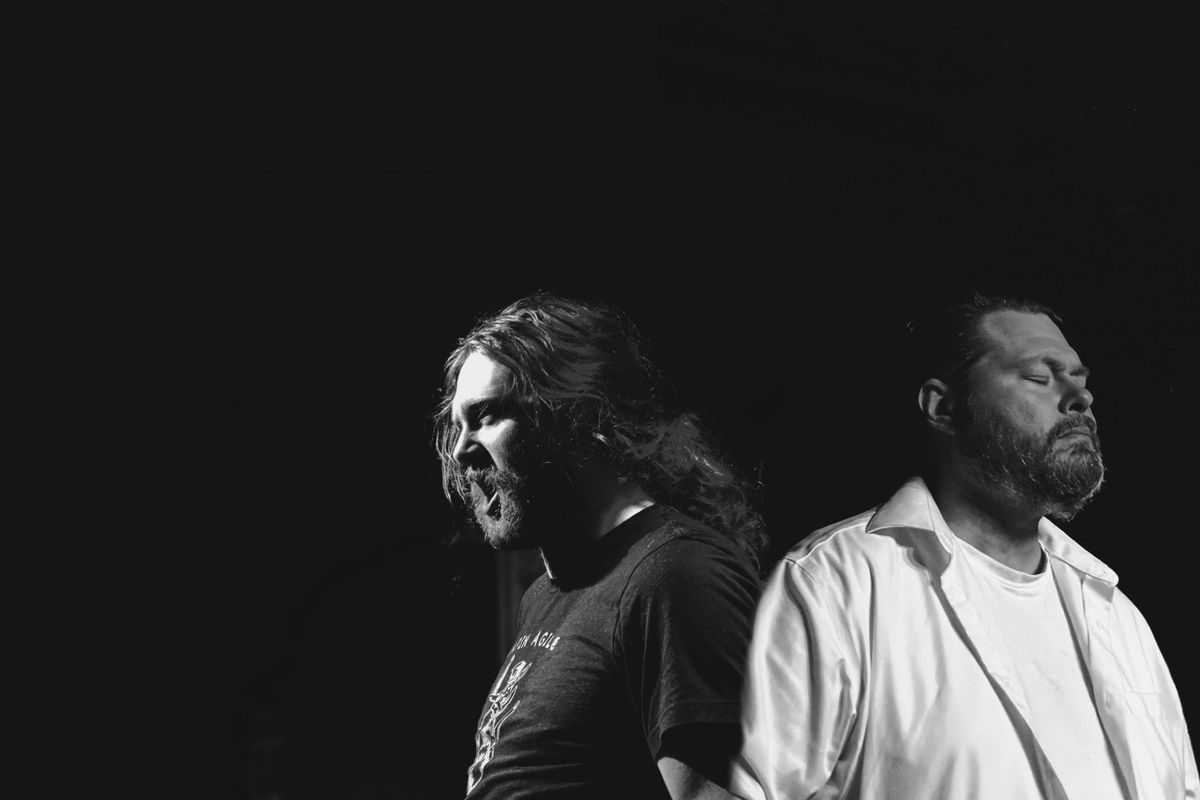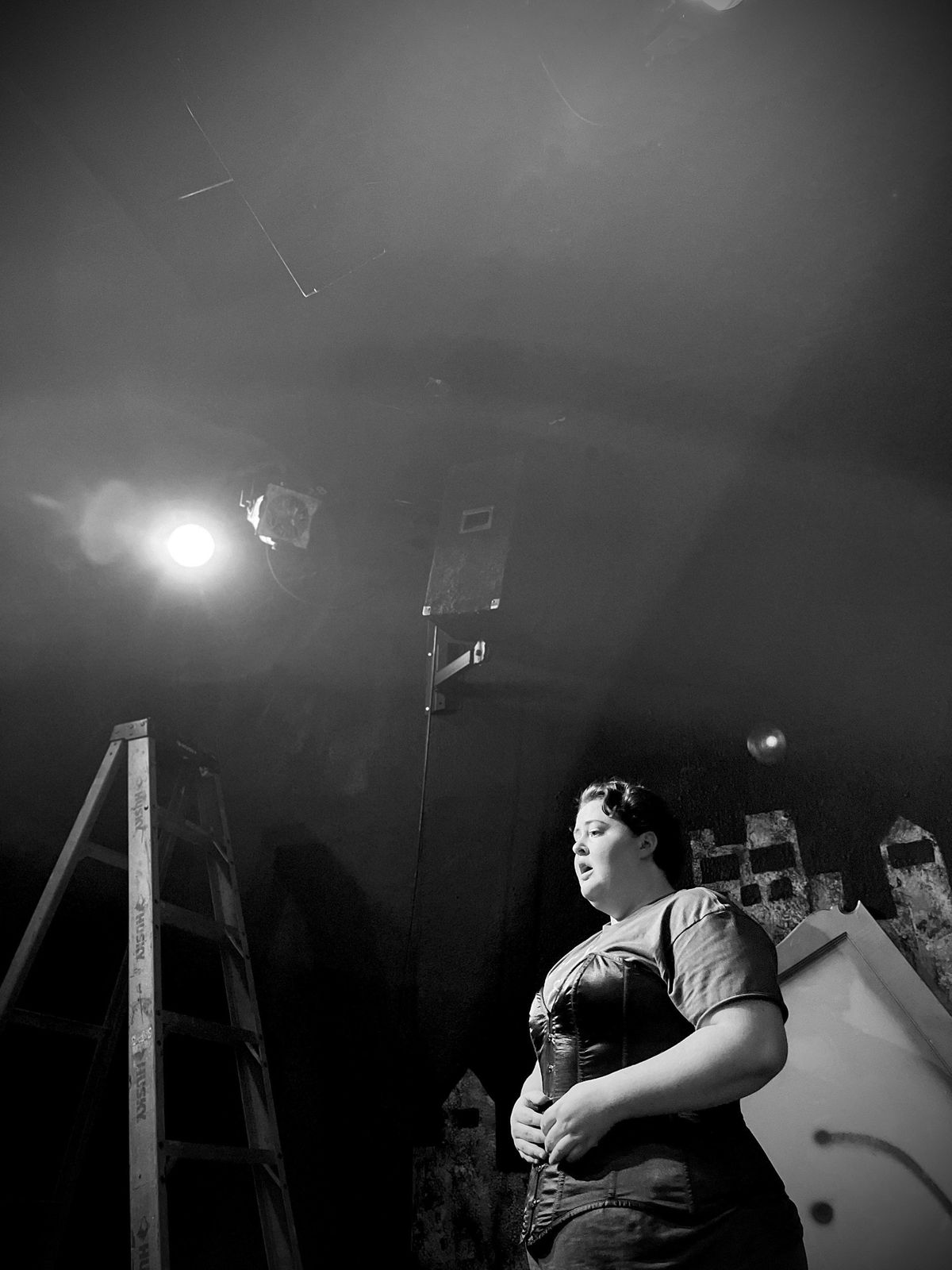With a fighting spirit, Lake City Playhouse’s first full season since burst pipe will go on with ‘Jekyll and Hyde’
Oskar Owens as Hyde and Daniel Hunt as John Utterson in Lake City Playhouse’s “Jekyll and Hyde.” (Courtesy of Kylee Fernandez-Lavier)
There’s a phrase in show business: “The show must go on.” If someone flubs a line, if a prop breaks, if the lighting or sound isn’t quite right, the show must go on.
But sometimes there are so many things thrown at you, it’s pretty near impossible to carry on, no matter how hard you try. Luckily for theater patrons, Lake City Playhouse has a fighting spirit.
In May 2021, a pipe burst in the theater’s basement, destroying many of the costumes stored there and taking out all of the plumbing. After a couple years, a lot of fundraising, generous donations from the community and tons of hard work, the much-needed theater renovations were complete enough that Lake City was able to stage “Oliver!” over the summer.
Now even more firmly grounded in their improved space, thanks in part to a $30,000 grant from the Women’s Gift Alliance for a new lightboard and LED lights, Lake City Playhouse is opening its first full season since the burst pipe with “Jekyll and Hyde,” which opens Thursday and runs through Oct. 6 at Lake City Playhouse.
The musical features music by Frank Wildhorn, lyrics by Wildhorn, Leslie Bricusse and Steve Cuden, and a book by Bricusse. It’s loosely based on the 1886 Robert Louis Stevenson novella “The Strange Case of Dr. Jekyll and Mr. Hyde.”
The show begins with John Utterson (Daniel Hunt) and Sir Danvers Carew (Paul Eloe), both associates of Dr. Henry Jekyll (Oskar Owens), taking the audience back in time to when the doctor was in an insane asylum singing about his father, who Jekyll believes is in a coma because of the evil within his soul. It’s Jekyll’s mission to find out about good and evil and how to separate the two.
Some time later, Jekyll presents his proposal to test his theory and formula on a human subject to the Board of Governors of St. Jude’s hospital. The board – Danvers, the Bishop of Basingstoke (Logan Tiedt), Sir Archibald Proops (Payton Player), Lady Savage (Wendy Crispin), Lady Beaconsfield (Marie Hunt), General Lord Glossop (Geoff Carr) and Sir Stride (Caid Wood, who also plays Spider) – vote against the idea, save for Danvers’ abstention. After hearing about the vote, Utterson urges Jekyll to continue his work.
And continue he does, deciding to inject himself with the formula he’s been working tirelessly on in his laboratory. After writhing in pain, Jekyll becomes Edward Hyde, an awful man who torments all he encounters.
Jekyll’s fiancée Emma Carew (Kylee Fernandez-Lavier), Lucy Harris (Kalla Mort), a woman Jekyll falls for at his bachelor party, the rest of the town and even Jekyll himself must then try to understand and deal with his big secret and the havoc Hyde wreaks.
“Jekyll and Hyde” also features Jolena Long as Nellie and Hunter Kennedy as Poole. The ensemble includes Rebecca Walker, Kynzie Washington, Francesca Drake, Brianna Weinberger, Madilyn Mushaney, Cory Drake, Jeffery Parsons, Ashley Techavimol, Nathen Eberts, Autumn McArthur and Amber Copeland.
Lake City Playhouse board president Brooke Wood, who is also directing “Jekyll and Hyde,” chose this musical because she wanted to show audiences that, after “Oliver!” and a fundraising performance of “Matilda” at the Kroc Center last year, Lake City also produces shows with more adult content. Plus, simply, she loves the musical, calling the songs mesmerizing.
She was also interested in the duality expressed in the show, primarily through Owens as Jekyll and Hyde. Owens, Wood said, put a lot of work into how he would differentiate between Jekyll and Hyde. When he’s Hyde, for example, his walk is that of someone on the prowl and his voice is very low. When he’s Jekyll, his walk is “bright and astute,” with a higher voice.
“You don’t question who it is because of how he has used, one, his voice, which is such a gift, but also he embodies whatever role he’s playing,” Wood said. “I do not have to worry, as a director, that he will not be there one thousand percent.”
That duality is also represented among classes, with a character like Emma, whose life feels stale and stagnant even though she is well off and has people who help dress her, and Lucy, who experiences the seedier side of London but also finds herself surrounded by a sisterhood of other lower-class women.
Mort, who plays Lucy, sees two sides to the character: who she is and who she wants to be.
“She dreams of a new life,” she said. “She wants more for herself. She wants to be in love, she wants to fall in love, all of these things I think everybody relates to. But who would have thought that it would be coming from this kind of a character?”
The biggest duality in the show of course is the good expressed by Jekyll and the evil expressed by Hyde as Jekyll continues to subject himself to his experimental formulas. And though people might not go through quite the transformation Jekyll does, Wood and Mort think audiences can still recognize themselves in a character who is trying to figure out who they are.
Is someone a good person, Mort asked, simply because they were raised wealthy? How do they interact with and respond to people who are in a different position in life?
“It’s still so poignant in this idea of who we think we’re supposed to be, who we are, and then the idea of sometimes the grass isn’t greener on the other side,” Wood said. “The greatest part of this show is that the brokenness of some of these people is sad, but it’s also what makes them achingly beautiful, and that’s what makes people who they are, is the story that led them there.”
While many left Jekyll’s side once Hyde started to appear, others, like Emma, Lucy and Utterson, stayed with him until the very end, despite his extreme changes. Wood said she sees a lot of choosing sides and pointing out differences in today’s society when we should be looking for similarities and common ground.
It’s her hope that Lake City Playhouse as a whole continues to be a place where people from all walks of life and all opinions can convene with the shared goal of enjoying a show.
“The biggest thing about the Playhouse is we want it to be a place where everyone can come together and everyone can watch beautiful art and feel like they are important and accepted and loved no matter what side they feel like they belong to,” she said. “It’s important that we celebrate the humanness of us all.”

